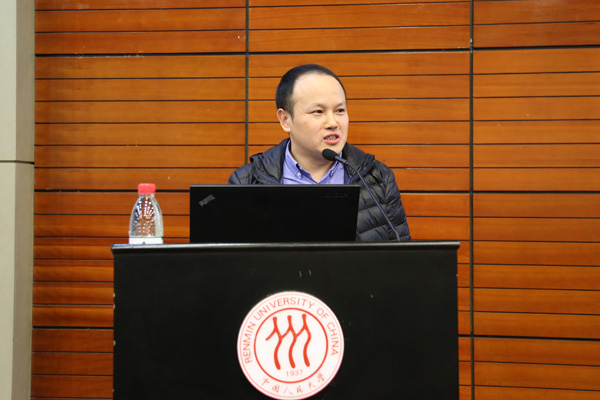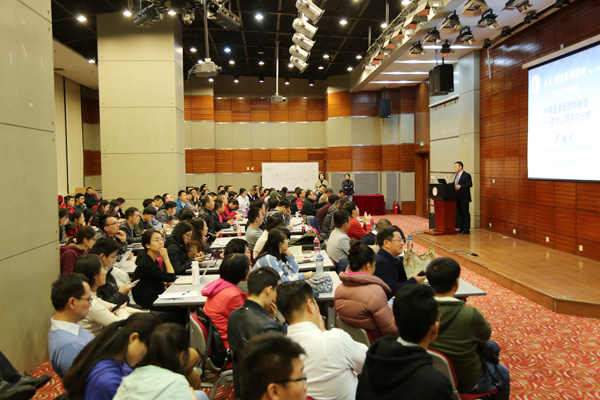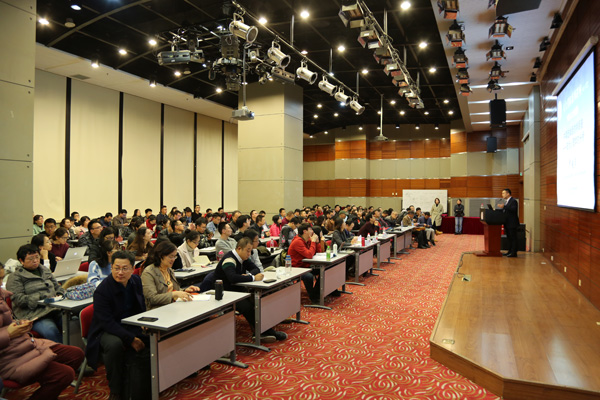Picture
Your Present Location: HOME> PictureYin Jiwu: Trump after midterm election——based on political psychological methodology
On November 9th, RDCY Seminar Series 132 was held in Chongyang Institute for Financial Studies at Renmin University of China (RDCY). Yin Jiwu, professor of School of International Studies at Renmin University of China, was invited to deliver a speech entitled Trump after US Midterm Election——based on Political Psychological Methodology.

First of all, Professor Yin introduced the methodology of political psychology. He pointed out that their research group adopted “Expert Test Methods” on analysis of Trump’s personality traits, which is a combination of factors analysis and qualitative assessment (made by Yin Jiwu, Zheng Jianjun, Li Hongzhou).
Professor Yin’s team has obtained the following five results through the "Expert Test Methods" in the study of Trump's personality traits and policy preferences.
First, Trump’s unscrupulous and capricious traits and policy preferences. According to a study by Professor Yin and his team, they found that Trump’s core personality trait is being unscrupulous and capricious, which means that it’s hard for Trump to respect the existing rules. In the course of specific actions, he is capricious and unpredictable. Professor Yin believes that Trump's unscrupulous and capricious personality traits laid the foundation for him to break existing policy preferences and norms. Under the influence of his traits, Trump will not really pay attention to the various conventional customs and policy consensuses in internal affairs and diplomacy, and attack unpredictably according to his own defined interests and his negotiation and game strategies.

Second, Trump’s efficient and ambitious traits and policy preferences. Trump has an acute insight into the development of the situation and specializes at acting with the changes of situation, which was shown in the election that he is adept at capturing the voters’ psychology and controlling his emotional expression. Trump’s ambition is manifested in his strong enterprise, mobility and execution. Professor Yin argues that Trump is likely to make totally subversive changes on the traditional American political norms and internal and external policy concepts based on Trump's capable personality traits.
Third, profit-seeking and self-centered traits and policy preferences. In terms of behavior-oriented characteristics, Trump’s personality can be summarized as profit-seeking and self-centered. The pursuit of interest constitutes Trump’s core motive of actions. Prof. Yin mentioned that Trump, as a businessman, has limitless pursuit of interests in the core of his interest view. Trump's view on interests shows two characteristics: one is his expertise in calculating benefits and costs and the other is his double-sided character in interest pursuing, which displays the image of being willing to take risks and speculation while he has a higher risk decision-making consciousness internally.
Fourth, persistent traits and policy preferences. In terms of external response, Trump's traits are mainly characterized by refractory, competitive and victorious personality traits, which can be described as "aggressive and persistent". Those with this trait have two distinct performances. On the one hand, Trump is full of fighting spirit and has strong resistance to stress in face of career obstacles. On the other hand, when this kind of style conflicts with social norms or interpersonal relationships, He will become very aggressive.
In Professor Yin’s perspective, due to Trump’s aggressive and persistent traits, he has a strong sense of policy execution power to a certain extent. We should take seriously with his basic policy declarations, such as building wall at the US-Mexican territorial boundaries, overturning Obama’s health care law, gun controlling and opposing abortion.
Fifth, Trump’s active and outgoing traits and policy preferences. Professor Yin noted that Trump’s active and outgoing characteristics may be transformed into an ambitious style of governing. Firstly, We can speculate that Trump is a president with high participation in political affairs. Secondly, Trump's active and outgoing personal style may reduce the bureaucratization of the White House administration. In particular, the simple and efficient habits formed in doing business may be reflected in American diplomacy. Therefore, we need to pay attention to adjust the communication skills in China-US diplomacy. Thirdly, Trump's optimism made him more willing to solve rather than shelving existing problems. For China, this is both an opportunity and a challenge. On the one hand, it may promote the resolution of existing problems between China and the US; on the other hand, it may also intensify the contradictions between the two sides. Fourthly, Trump learns new knowledge rapidly and has an open mentality. So he can increase his understanding and reduce his misunderstanding and hostility for China through appropriate approaches.
As a non-traditional political leader, Trump doesn’t possess any political background and performs uniquely in statements and actions. How to recognize such a president has become a vital foundation to understand America and conduct China-US diplomacy.

At the end of the lecture, Professor Yin had a face-to-face exchange with the audience. In terms of research methods, the influence of the characteristics of Chinese and American leaders on the China-US relationship, Prof. Yin gave his own views according to his research results and perspectives.























































































 京公网安备 11010802037854号
京公网安备 11010802037854号





